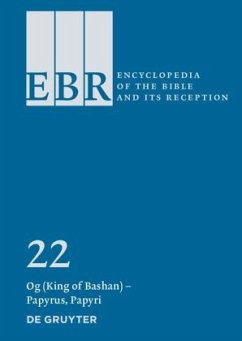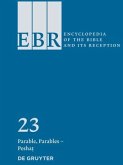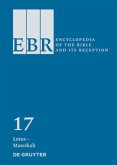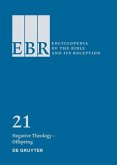The projected thirty-volume Encyclopedia of the Bible and Its Reception (EBR) is intended to serve as a comprehensive guide to the current state of knowledge on the background, origins, and development of the canonical texts of the Bible as they were accepted in Judaism and Christianity. Unprecedented in breadth and scope, this encyclopedia also documents the history of the Bible's interpretation and reception across the centuries, not only in Judaism and Christianity, but also in literature, visual art, music, film, and dance, as well as in Islam and other religious traditions and new religious movements.
The EBR is also available online.
Blogger's Choice - Articles recommended by biblioblogger Jim West (https://zwingliusredivivus.wordpress.com):
Joanna Töyräänvuori (Helsinki, Finland), Og (King of Bashan) I. Hebrew Bible/Old Testament. Töyräänvuori has written on "Og (King of Bashan)" in the Hebrew Bible. Other essays in a larger discussion centeron Og in Judaism, Christianity, Islam, literature, and the visual arts. Who knew that such a secondary character could or would generate such interest outside of his original story? And yet he certainly did! The etymology of his name is discussed, his homeland is described, and his appearance in the Hebrew Bible and ancient Near Eastern texts is discussed.
Gudrun Holtz (Tübingen, Germany), Old Age III. New Testament. Being elderly myself I thought I'd be keen to read the entry on "Old Age" in the New Testament by Holtz. I wasn't wrong. The conclusion made me smile. "The weight of the new in the NT, thereby, explains the relative unimportance it places on old age and the elderly." Age is just a number, in other words, and the New Testament doesn't make much of a big deal about it. That's a relief, isn't it? It's a marvelous article, filled with details from NT texts that the old, and young, will benefit from.
Adele Reinhartz (Ottawa, ON, Canada), Old Testament X. Film. The work of Adele Reinhartz needs neither commendation nor recommendation: her oeuvre is well known by every single person who works in the field of biblical studies. Small wonder, then, that her contribution in this volume on the "Old Testament" in Film is superb. She shows quite convincingly that the portrayal of OT figures and events are generally filtered through the lens of Protestantism. "The films imply that Christianity is the true heir of and the primary vehicle for the ideas, such as faith, prayer, and loyalty, that are valorized in these films." And later "... the ultimate message [of these films] is an affirmation of Christian faith." It's a genius analysis throughout the all too brief piece.
John T. P. Lai (Hong Kong, China), Opera, Chinese. Knowing nothing about a subject and being able to discover new things is one of the great benefits of EBR. Chinese opera is one of the many things that, prior to reading the present entry, I knew absolutely nothing about. I'm familiar with European Opera. In fact, I'm a huge fan of the genre (with pride of place going to my beloved Mozart). After having read Lai's piece I will now find Chinese opera on YouTube and give it a listen. Lai writes "As a form of musical theater, traditional Chinese opera amalgamates an array of artistic forms, including singing, dance, martial arts, acrobatics, and elaborate mak
Hinweis: Dieser Artikel kann nur an eine deutsche Lieferadresse ausgeliefert werden.
The EBR is also available online.
Blogger's Choice - Articles recommended by biblioblogger Jim West (https://zwingliusredivivus.wordpress.com):
Joanna Töyräänvuori (Helsinki, Finland), Og (King of Bashan) I. Hebrew Bible/Old Testament. Töyräänvuori has written on "Og (King of Bashan)" in the Hebrew Bible. Other essays in a larger discussion centeron Og in Judaism, Christianity, Islam, literature, and the visual arts. Who knew that such a secondary character could or would generate such interest outside of his original story? And yet he certainly did! The etymology of his name is discussed, his homeland is described, and his appearance in the Hebrew Bible and ancient Near Eastern texts is discussed.
Gudrun Holtz (Tübingen, Germany), Old Age III. New Testament. Being elderly myself I thought I'd be keen to read the entry on "Old Age" in the New Testament by Holtz. I wasn't wrong. The conclusion made me smile. "The weight of the new in the NT, thereby, explains the relative unimportance it places on old age and the elderly." Age is just a number, in other words, and the New Testament doesn't make much of a big deal about it. That's a relief, isn't it? It's a marvelous article, filled with details from NT texts that the old, and young, will benefit from.
Adele Reinhartz (Ottawa, ON, Canada), Old Testament X. Film. The work of Adele Reinhartz needs neither commendation nor recommendation: her oeuvre is well known by every single person who works in the field of biblical studies. Small wonder, then, that her contribution in this volume on the "Old Testament" in Film is superb. She shows quite convincingly that the portrayal of OT figures and events are generally filtered through the lens of Protestantism. "The films imply that Christianity is the true heir of and the primary vehicle for the ideas, such as faith, prayer, and loyalty, that are valorized in these films." And later "... the ultimate message [of these films] is an affirmation of Christian faith." It's a genius analysis throughout the all too brief piece.
John T. P. Lai (Hong Kong, China), Opera, Chinese. Knowing nothing about a subject and being able to discover new things is one of the great benefits of EBR. Chinese opera is one of the many things that, prior to reading the present entry, I knew absolutely nothing about. I'm familiar with European Opera. In fact, I'm a huge fan of the genre (with pride of place going to my beloved Mozart). After having read Lai's piece I will now find Chinese opera on YouTube and give it a listen. Lai writes "As a form of musical theater, traditional Chinese opera amalgamates an array of artistic forms, including singing, dance, martial arts, acrobatics, and elaborate mak
Hinweis: Dieser Artikel kann nur an eine deutsche Lieferadresse ausgeliefert werden.








